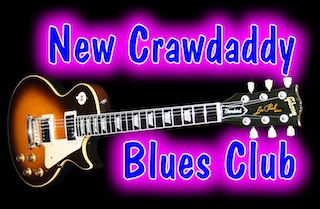Albert King was an American blues guitarist and singer, and a major influence in the world of blues guitar playing.
Born on April 25, 1923 One of the “Three Kings of the Blues Guitar” Albert King stood 6 ft 4 in (1.93 m) and weighed 250 pounds (110 kg] and was known as “The Velvet Bulldozer”. a name he earned as early in his career he drove one of them and also worked as a mechanic to make a living.
He began his professional work as a musician with a group called In The Groove Boys in Arkansas USA. In St. Louis, Missouri, he briefly played drums for Jimmy Reed’s band and on several early Reed recordings. Influenced by blues musicians such as Blind Lemon Jefferson and Lonnie Johnson, but also, interestingly enough, Hawaiian music, the electric guitar became his signature instrument, his preference being the Gibson Flying V which he named “Lucy”
In 1967 he released the album Born Under a Bad Sign The title track of that album (written by Booker T. Jones and William Bell) became King’s best known song and has been covered by many artists (from Cream to Homer Simpson).
Albert King went on to become a major force in the Blues music industry during his lifetime touring the world, releasing several albums and influencing others such as Mick Taylor, Derek Trucks, Warren Haynes, Mike Bloomfield and Joe Walsh He also had an impact on contemporaries Albert Collins and Otis Rush.
Eric Clapton has said that his work on the 1967 Cream hit “Strange Brew” and throughout the album Disraeli Gears was inspired by King.
King died on December 21, 1992 from a heart attack in his Memphis, Tennessee home.
Source: Wikipedia
Riley B. King (born September 16, 1925), is an American blues guitarist and singer-songwriter. Rolling Stone magazine ranked him at No.3 on its list of the 100 greatest guitarists of all time.
King introduced a sophisticated style of soloing based on fluid string bending and shimmering vibrato that would influence virtually every electric blues guitarist that followed.
Initially he worked at the local R&B radio station as a singer and disc jockey, where he gained the nickname Beale Street Blues Boy, later shortened to Blues Boy and finally to B.B. He received his influence from listening to T. Bone Walker which led him to acquire an electric guitar.
King began his recording career in 1949 in Los Angeles and went on to become the man and the name that has become synonymous with the Blues music genre, often referred to as Ambassador of the Blues.
In 1980 King was inducted into the Blues Hall of Fame. In 2004 he was awarded the international Polar Music Prize, given to artists “in recognition of exceptional achievements in the creation and advancement of music. The recipient of 16 Grammy awards throughout his career including a Grammy Lifetime Achievement Award in 1987 B.B. King has also been awarded most of the highest honors open to civilians in the United States including the Presidential Medal of Freedom in 2006.
In the winter of 1949, B.B. King played at a dance hall in Twist, Arkansas. In order to heat the hall, a barrel half-filled with kerosene was lit, a fairly common practice at the time. During a performance, two men began to fight, knocking over the burning barrel and sending burning fuel across the floor. The hall burst into flames, which triggered an evacuation. Once outside, King realized that he had left his guitar inside the burning building. He entered the blaze to retrieve his beloved guitar, a Gibson semi-hollow electric. Two people died in the fire. The next day, King learned that the two men were fighting over a woman named Lucille. King named that first guitar Lucille, as well as every one he owned since that near-fatal experience, as a reminder never again to do something as stupid as run into a burning building or fight over women.
Source: Wikipedia
Born Frederick Christian, on September 3, 1934 – December 28, 1976), and nicknamed “the Texas Cannonball”, was an influential African-American blues guitarist and singer. He is often mentioned as one of “the Three Kings” of electric blues guitar, along with Albert King and B.B. King, as well as the youngest of the three.
Freddie King based his guitar style on Texas and Chicago influences and was one of the first bluesmen to have a multi-racial backing band onstage with him at live performances. He is best known for singles such as “Have You Ever Loved A Woman” (1960) and his 1961 Top 40 hit “Hide Away”.
King had a twenty-year recording career and became established as an influential guitarist in the early 1960s. He inspired American musicians such as Jerry Garcia, Stevie Ray Vaughan and his brother Jimmie Vaughan. His influence was also felt in the UK, through recordings by blues revivalists such as Eric Clapton, Peter Green, and Chicken Shack.
King died on December 28, 1976 in the height of his career aged 42 in Dallas, Texas.
Source: Wikipedia



























